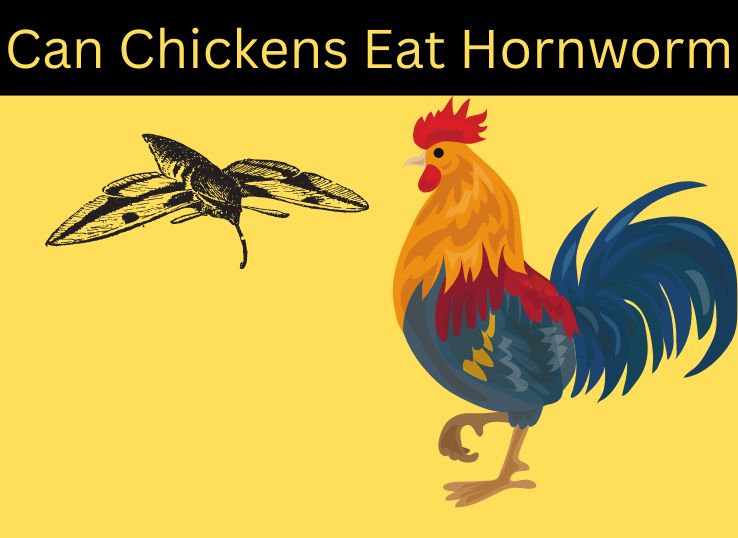Last Updated on March 7, 2023
Let’s clear out the question of whether chickens can eat hornworms or not. Hornworms are small caterpillars that emerge on tomato plants. Chickens can eat hornworms and love to feed on these nutritious caterpillars.
You may observe an increase in the population of hornworms in the spring and summer seasons. This is because they are prevalent in tomato plants and are quite destructive to them. These hornworms are caterpillars of Manduca hawk moths.
The increase in the chicken population gives rise to many new food sources. Hornworms are one of them and act as a good source of nutrients for the 518.6 million chicken population in the US. The use of alternate food sources is important to meet the 2.28 billion USD value of chickens.
My today’s article focuses on the importance and safety of hornworms for chickens. We’ll discuss the safety and palatability of hornworms in chickens. It is important to acknowledge why and how to feed hornworms for health benefits.

Table of Contents
ToggleIs Feeding Hornworms Safe for Chickens?
Probably the most crucial question is regarding the safety of hornworms. If you want to feed hornworms to chickens, they are completely safe. In addition to tomato plants, hornworms are also present in tobacco plants.
Being a veterinarian, I can assure you that hornworms are not poisonous to chickens. Most birds love to peck at these worms as they find them quite delicious. Yet, a hornworm that is feeding on the tomato plant possesses some health concerns.
Tomato is a widely grown plant all across the world. The leaves of this plant contain a toxin known as Solanine. This toxin is readily available in the caterpillar’s gut but doesn’t cause any harm to it. But, a study has shown that Solanine is toxic to the health of chickens.
The toxic effects of solanine are not very clear if a chicken eats hornworms in smaller amounts. Pecking on the small number of worms is not of any concern and doesn’t affect the chicken. But, feeding large quantities of hornworms can result in solanine toxicity.
If you have tomato plants present in your backyard, you often see your chicken around them. Chickens are constantly in search of hornworms as they provide many nutritional benefits. I recommend you go for a reputable seller if you want to buy hornworms commercially.
Benefits of Hornworms for Chickens
There is a reason why chickens love to eat hornworms, and that is the nutritional profile. Analysis indicates that hornworms are a good source of moisture and calcium. Hornworms contain 85% moisture content that can fulfill chicken’s hydration requirements.
I can’t ignore how rich hornworms are in calcium and phosphorous. There is nearly 465 mg of calcium present in 1 kg of hornworms. The concentration of phosphorous is around 1394 mg/kg. The amount of both these minerals can improve the health of chickens.
A good amount of calcium and phosphorous is necessary for egg-laying birds. These minerals can support egg production in layer breeds. It is also important for eggshell formation in laying chickens. Chicks can get special benefits from the mineral content for their speedy growth.
Hornworms contain 9% protein which is a fair amount to fulfill their daily protein needs. Protein is important for amino acid synthesis and increases muscle mass in chickens. A handful of hornworms is enough for the flock to get these nutritional benefits.
Not only adults but chicks can also feed on hornworms without any problem. Hornworms have 3% fat in them which is one of the highest energy sources. In the summer, chicks can munch on hornworms to maintain their body’s hydration status.
Hornworms Feeding Guidelines for Chickens
To feed hornworms, you must look out for how much you’re feeding your chickens. Hornworms contain toxic solanine from the tomato plant. You must take special attention to the quantity and source of hornworms.
If tomato or tobacco plant is present in your backyard, you can allow your chickens to roam around them. As soon as they notice a worm crawling, they won’t hesitate to eat the worms. Having a quick snack of worms is not only beneficial for chickens but also for your plants.
Make sure to buy hornworms from a trusted seller in the supermarket. The commercially available worms are a safer option for chickens as they don’t grow on tomato plants. You can add them to the regular meal of chickens from time to time.
It is important to note that these hornworms are a treat for chickens. You must not rely on the worms as the main course for chickens. Simply add some hornworms from the plants into their feed and you’re good to go.

Conclusion
Hornworms are an excellent source of water and calcium with good taste in the case of chickens. The chickens can eat these worms without any problem getting the nutrients out of them. You should take care of the quantity as tomato hornworms contain solanine toxin.
Finding new and workable feed sources is a creative way of keeping your chickens healthy. As a veterinarian, I recommend feeding your chickens hornworms as a mineral source.
Research References
Thurston, Richard, and Ocha Prachuabmoh. “Predation by birds on tobacco hornworm larvae infesting tobacco.” Journal of Economic Entomology 64.6 (1971): 1548-1549.
Lawison, F. R., et al. “Studies of an integrated control system for hornworms on tobacco.” Journal of Economic Entomology 54.1 (1961): 93-97.

I am a Veterinarian by profession having 3 years of experience in raising poultry flocks. So far my number of successful flocks is 9. I am sharing all my experience about poultry farming with you so that you can make this profession your bread and butter. Stay Tuned with my latest post.
